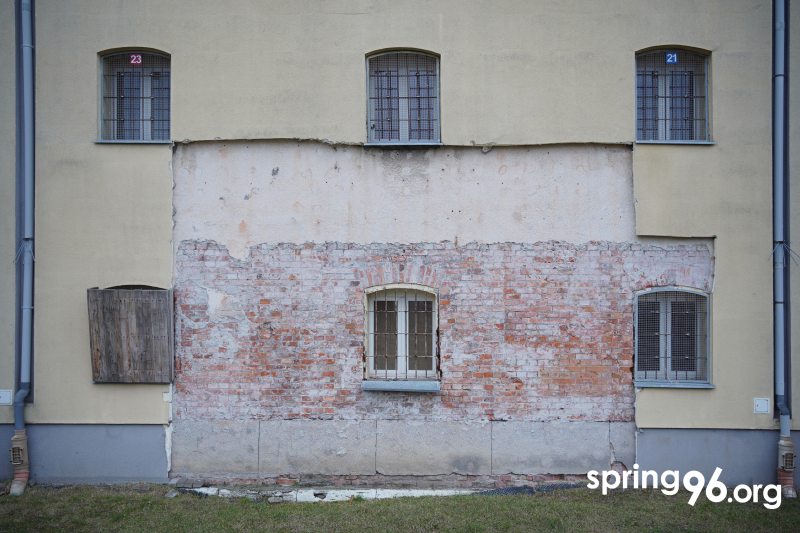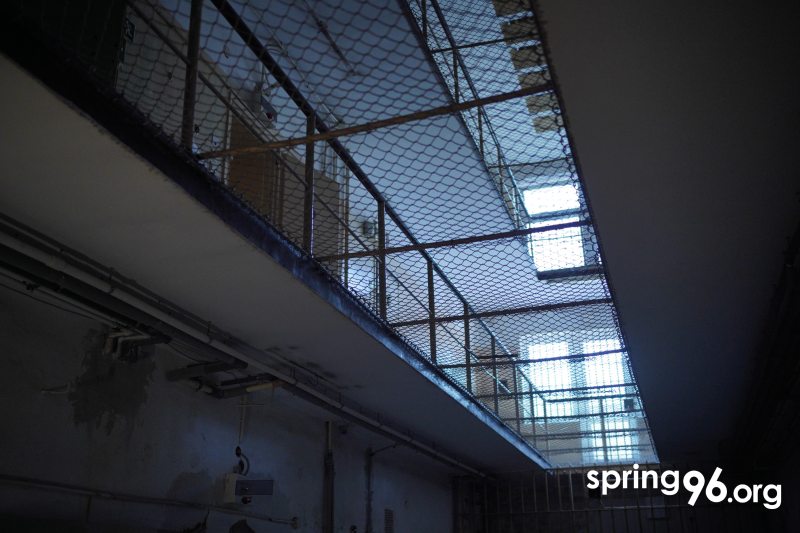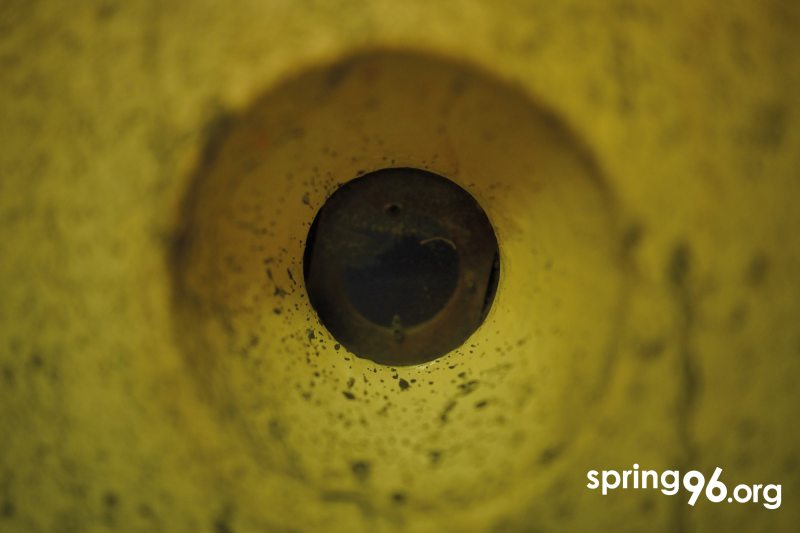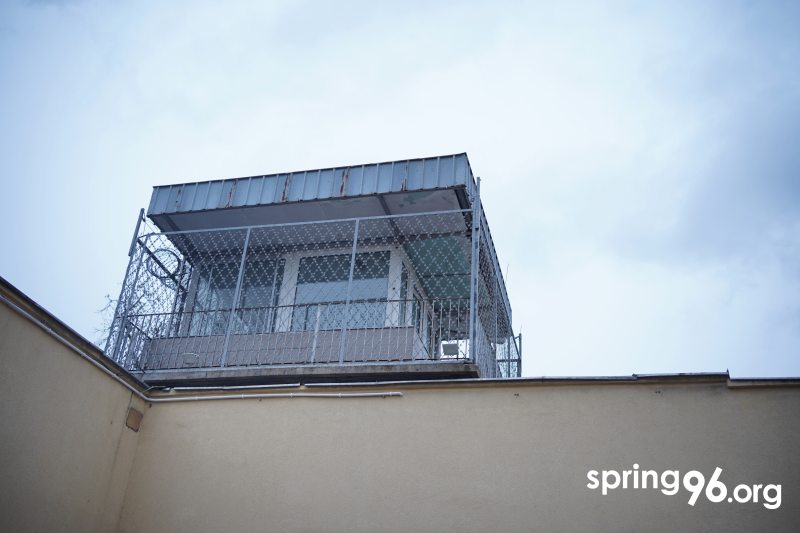"The investigator turned to the wall and began to cry." The story of a senior citizen who was convicted for participating in protests
Senior citizen Aliaksei (name changed for security reasons) was detained in 2022 after his neighbor snitched on him. A whole minibus of riot police and GUBOPiK employees arrived to his cottage. The man went through torture at Akrescina and Valadarka prison and was sentenced to restriction of freedom for participating in protests. During his home confinement he had checks at night and had to meet with an ideologist who taught him "how to love the homeland properly." The man lived in constant fear and anxiety for several months and eventually left Belarus.
Aliaksei told Viasna how twenty thousand dollars were stolen from him during a search, and how he fainted from COVID at Akrescina. How the senior citizen slept on a concrete floor in an overcrowded punishment cell and got prostatitis. How an investigator cried during an interrogation. And how Aliaksei asked smugglers to help him escape from Belarus and jumped for joy when he was safe.

- The image is illustrative. Photo: spring96.org
During the search, money for a "rainy day" disappeared
Aliaksei lived in a private house near Minsk. The man was detained in the summer of 2022 after his neighbor snitched on him.
"The snitching neighbor is a former police officer. He knew about my political position and treated me badly. In his report, he wrote that I went to the protests in 2020."
On the morning of his arrest, the man was driving to work. Two minibuses of riot police and a passenger car with the employees of Main Directorate for Combating Organized Crime and Corruption (GUBOPiK) blocked the road. The policemen started shouting and hitting Aliaksei's car with batons. They dragged him outside and took him home for a search.
The security forces were looking for "extremist materials, drugs, and weapons," the source says. A white-red-white flag was found at Aliaksei's house.
"They also found a US flag, which I brought back from a trip to America. One officer stamped his feet and jumped on it."
The search was carried out not only in the house, but also in the chicken coop, in hives where there were no bees, and in other outbuildings.
Aliaksei says that the security forces stole 20,000 dollars from him during the search.

- The image is illustrative. Photo: spring96.org
"It's a great merit that you don't beat up your father."
Next, the man was taken to a GUBOPiK department. The security forces constantly drew the man's attention to the fact that they did not beat him, although all detainees usually say the opposite about the security forces, says Aliaksei.
"It's a great merit that you don't beat up your father." After all, I was their fathers' age. But I saw that they did not understand me."
During the recording of a "repentant" video, Aliaksei named his age: more than 60 years old. The security forces did not like this and they ordered the man to film the second take.
The leather slippers from the punishment cell reminded of a film about Auschwitz
After the interrogation, the interlocutor was taken to Akrescina, where he spent three days before the trial. At first, Aliaksei was sentenced to 10 days of arrest for sending a video of Pavel Latushka's speech to a friend on Telegram.
"At first, I was put in a small cell, which housed about 20 people. Andrei Zhuk, the owner of the Banki-Butelki bar, was with me in the cell. For several days we spent the night on the floor, nose to nose."
Later, Aliaksei was transferred to cell No. 4, where he met artist Hennadz Drazdou. Aliaksei fell ill with COVID in that cell. His daughter tried to transfer the medicines to the man, but the administration of the detention center did not give them to him.
After serving his administrative arrest, he was immediately detained again in a criminal case for participating in protests (Article 342 of the Criminal Code).
"During my administrative arrest, the security forces found a photo from a protest in my phone. I was put in a well-known torture cell of the temporary detention facility: No. 7. 10–12 people were put in a single punishment cell with an area of about six meters. We couldn't even lie down. The toilet was a hole in the floor. It was, of course, a horror. It was forbidden to lie down during the day. I often fell down. I felt really bad because of the coronavirus. Around the third day in that cell, I fainted. When the cellmates started banging on the door, that's when the doctor came. I remember how, half asleep, he measured my blood pressure: it was over 200. He gave me just one pill during my whole detention."
The man says that it was prohibited to be in one's own shoes in cell No. 7. His sneakers were left outside, and instead everyone was given leather slippers without a size indicated.
"I watched a movie about Auschwitz. And those slippers reminded me a lot of the shoes from the movie."
"My arms still hurt in the shoulders"
Twice a day, Aliaksei and other prisoners were taken out for inspection with their hands lifted behind their backs.
"I was in a very bad condition, half-conscious, and could barely keep my head bent to the floor with my hands in the air. The guard beat my hands with a baton to keep them even higher. My arms still hurt in the shoulders to this day. The guards beat me and others on the legs so that we spread them wider. It happened every day morning and evening."
Because Aliaksei was ill and elderly, other prisoners put him on the floor. The rest slept standing or sitting on the toilet.
Every morning, during the inspections, the head of the detention center personally came to cell No. 7.
"He constantly threatened us with violence and said: "I remember how in 2020 my family almost turned gray. I remember you calling my children and threatening them." Although none of us, of course, called him," the source says.

- The image is illustrative. Photo: spring96.org
"The investigator turned to the wall and began to cry"
The man stayed in pre-trial detention center-1 on Valadarskaha for three months before the trial.
"After the punishment cell on Akrescina, staying at Valadarka prison felt much easier. About half of my cell-mates were political prisoners. We all stuck together. Even now, I keep in touch with the relatives of some political prisoners I did my time with at Valadarka prison."
During his stay in the pre-trial detention center, four more episodes were added to Aliaksei's criminal case.
"I once sent photos from the marches to one of my friends, which I did not delete. They were found in my phone. The investigator then said that the case was ready and she would not come again. But one Friday I was called for questioning again. The investigator says, "Well, I've found another [episode]." I thought then: "Well, that's it, they'll definitely put me in jail." And I said very emotionally that if she came to me again, I would curse her and her children. The investigator turned away from me to the wall and began to cry. As I later learned from the lawyer, she was pregnant at the time. After this incident, the investigator did not come to me again, and the case was soon sent to court."
The man says that he got prostatitis at Valadarka prison and had the inflammation of kidneys. And after his release, he was suspected to have cancer.
As the result of the trial, Aliaksei was sentenced to several years of home confinement.
"I thought I was afraid because I'm old and cowardly."
The man says that after his release, having survived the tortures at Akrescina and Valadarka prison, he did not doubt for a single minute that he needed to leave Belarus.
"It was unbearable to live. You're afraid all the time. They come with checks even at night. Even during the day in the city, it seemed all the time that I was being watched. I thought I was afraid because I'm old and cowardly. But then I talked to the young people who were also in home confinement. It turned out that everyone had the same feelings."
Periodically, Aliaksei was to visit an ideologist who asked him questions about his homeland.
"At the next such meeting, I couldn't stand it anymore and exploded. I began to ask where they got such hatred for senior citizens. First, I was tortured at Akrescina, then at Valadarka. And now they are teaching here how to love the homeland properly. After that, they didn't call me to those meetings anymore."
During his home confinement, the man managed to prepare for his departure: he got a humanitarian visa, got a new passport, and resolved issues with real estate.

- The image is illustrative. Photo: spring96.org
"Aliaksei, you won't run away."
The man was born in the Hrodna region on the border with Lithuania.
"The Lithuanian border is already visible from a neighboring village. I made an unsuccessful attempt to escape near it. Now a high fence with video cameras has been built there. My relatives there immediately told me: "Aliaksei, you won't run away."
The man also asked the Astravec "cigarette men" (cigarette smugglers – ed.) to help him.
"The smugglers put up a price for their service: $3,000. I agreed and even rode with them, thinking that it was over. But because of another migrant attack on the border, border guards were alerted. I failed again."
As a result, Aliaksei escaped in another way.
"I was jumping for joy for a long time"
"When I was already on Lithuanian territory, I was very happy and was jumping for joy for a long time."
But despite the joy of being safe, Aliaksei still fondly remembers his life in Minsk.
"I had a good car, a good job, a very beautiful house with a winter garden. I loved my land very much. Although I traveled a lot, I returned home with big joy. And imagine how they [the Belarusian authorities] have now stifled any desire to come there. But I know that I will definitely return there."

















